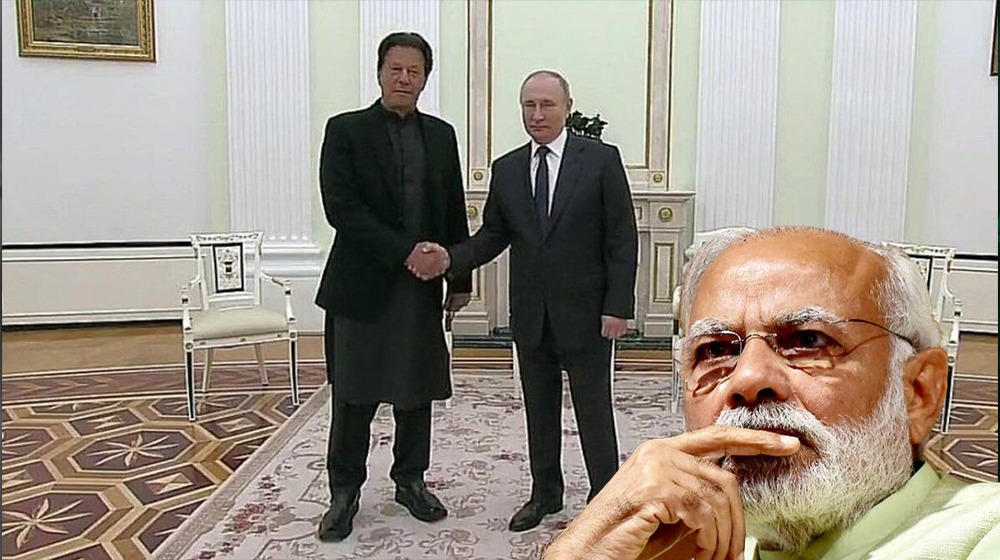Despite the pounding backdrop of Russian missiles falling on Eastern Ukraine, Pakistani Prime Minister Imran Khan’s two-day trip to Russia – notwithstanding what foreign and domestic critics would have us believe – was, by all accounts, a strategic success.
The real measure of the visit’s success, however, may be better gauged by how Pakistan’s regional rival, India, reacts to the strengthening of ties with Russia.
The visit – the first in 23 years by a Pakistani Prime Minister – was, according to the Kremlin, an opportunity for the leaders of the two countries to discuss “the main aspects of bilateral cooperation and [to exchange] views on current regional topics, including developments in South Asia”.
More substantive talks were held on the topic of mutual energy enhancement cooperation – specifically the long-delayed joint Russian-Pakistani construction of a gas pipeline.
By all accounts these vital talks went well and the future of the relationship between Pakistan and Russia seems to have been cemented further.
Not surprisingly, the talks between PM Khan and Russian President, Vladimir Putin were overshadowed by the ongoing crisis in Ukraine. Indian analysts – and some Pakistani ones, too – have tried to muddy the waters by suggesting that the visit should not have gone ahead, gleefully predicting – incorrectly, as it turned out – that Pakistan would suffer geopolitical ramifications by aligning herself with Russia at such a critical time.
One could almost hear the delighted cackles from New Delhi as they predicted ignominy and international censure of Pakistan for the blunder of embarking on this foreign adventure.
Disappointingly for the naysayers, however, measured statements by both leaders, with PM Khan adroitly treading the line between achieving Pakistani goals and avoiding any controversial comments on the conflict in Ukraine, have proven, yet again, that his foreign policy objectives remain firmly rooted in Pakistan’s best interests, while avoiding alienating any potential or erstwhile allies.
Before arriving in Moscow, PM Khan stressed that the visit had been scheduled long before the violence in Ukraine escalated and that while all countries should learn from history and recognize the futility of war, the current crisis in Ukraine was not directly a Pakistani concern.
Pakistan’s American allies also understood the purpose of the visit and their only comment was that they had discussed with their Pakistani counterparts what their stance has always been regarding the escalating crisis in Ukraine. Another disappointingly measured response for those who had hoped for a more explosive bludgeoning of Pakistan’s foreign policy aspirations by Washington.
The visit by PM Khan – by invitation directly from the Kremlin – has undoubtedly ruffled Indian feathers. Indian news outlets have focused on how the visit could be seen as an implicit endorsement of Russia’s actions in Ukraine, with the Times of India voicing its concern over PM Khan’s ‘ill-timed visit’.
The emerging nexus between Russia, China and Pakistan continues to exercise the minds of analysts and politicians in New Delhi. While Pakistan has been unequivocal about its desire to act as a bridge between all of its allies, Indian Foreign Policy continues to rest on the premise that the only way they can ensure relevance is to paint Pakistan as the villain of the piece in the minds of its western allies.
Undoubtedly, this policy has served India well in the past. Despite the devastating and heartbreaking losses incurred by Pakistan as frontline actors in the war on terror, New Delhi has doggedly painted Pakistan in the worst possible light to the outside world. Pakistan’s image has been damaged – in some circles, beyond repair – by India’s incessant onslaught against Pakistani interests and her efforts to achieve economic stability.
It is no secret, for example, that Pakistan continues to unnecessarily languish on the Financial Action Task Force’s ‘grey list’ thanks to negative Indian lobbying efforts.
While Pakistan looks to the future – developing strategic alliances based on mutual interests and acting as a conduit for dialogue between disparate foreign governments – India continues to define herself on the politics of opposition: opposition to any attempts by Pakistan to shore up her economy, opposition to Pakistan’s foreign policy and domestic objectives and, frankly, opposition to all that Pakistan stands for.
India’s response to PM Khan’s visit to Russia – once her own most powerful ally – has been cautious. If past history is anything to go by, however, plans are likely afoot to find ways to sour yet another potentially fruitful alliance between Pakistan and a key international player.
Russia, however, is a more difficult nut to crack than the Indian propaganda machine may have previously encountered. Russia knows where her interests lie and, with China – a key regional player, and no stranger itself to Indian smear tactics – acting as matchmaker between Russia and Pakistan it may well be that, on this occasion, at least, India may have bitten off more than it can chew and rather than casting Pakistan as a pariah could well find herself on the receiving end of what she has dished out to Pakistan for so long.


























I want whatever the author of this article has been smoking.
incredible one keep it up thanks for best sharing